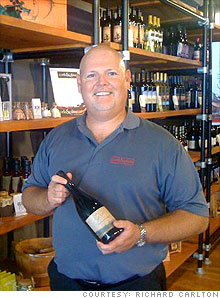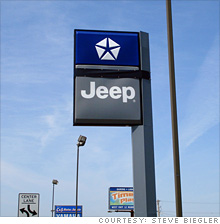Dragged into a bankruptcy that isn't yours
When a franchise company goes bankrupt, independent operators face a tsunami of legal tangles and marketing challenges.
 |
| When Cork and Olive went bankrupt, franchise owners like Richard Carlton were left to rebuild their infrastructure from scratch. |
 |
| Steve Biegler added a black armband to the Chrysler sign outside his South Dakota dealership, one of more than 700 slated to lose its franchise. |
NEW YORK (CNNMoney.com) -- "Bankruptcy" isn't a word business owners want linked to their venture, but when a franchise company goes broke, independent operators get branded by association -- even if their own store remains healthy and profitable.
It's a problem more franchisees will be facing in the coming months. The recession has hit retailers hard, and within the last year, major franchisors including Mrs. Fields, Dial-a-Mattress and Bally Total Fitness have filed for bankruptcy.
Typically, downturns work in favor of franchisors as jobless workers invest severance packages and savings in new ventures. But this time around, the extremely tight credit situation is preventing aspiring entrepreneurs from launching.
"The number-one driver of franchisor sales is unemployement, because more people turn to franchising to do something else with their life," says Mark Siebert, CEO of franchise consulting firm iFranchise Group in Homewood, Ill. "But given the credit situation, there's an inability to finance franchises, particularly the high-end ones."
Business owners who operate under a franchise agreement pay royalties for the use of the franchisor's brand in return for the benefits of the parent company's marketing, supply chain, operating procedures and other established systems. All that can fall apart if the franchisor files for bankruptcy. As the recession drags on and franchise royalties fall, franchisors can run into trouble covering their fixed operating costs -- particularly if they are unable to generate new franchisee locations.
In the first quarter of 2009, there were 14,319 business bankruptcies in the U.S. -- a 64% surge from 2008, and the highest of any quarter in at least the past 15 years, according to the American Bankruptcy Institute.
While little data exists on bankruptcies specifically in the franchise field, the International Franchise Association (IFA) and PricewaterhouseCoopers found in a January study that the economic decline is taking its toll. They project that the number of franchise establishments in America will decline by 1.2% in 2009 -- a net loss of 10,000 of the nearly 865,000 establishments that existed in 2008.
It's a common misconception that bankruptcy means closing up shop. In some cases, it can actually be the best solution to keep the doors open -- even if it means the franchisees, investors or other companies assume ownership. Denny's (DENN), Boston Market, Days Inn and 7-Eleven each filed for Chapter 11, and all are alive and growing today.
"Bankruptcy of the franchisor is not necessarily bad for the franchise system or franchisees," says Alisa Harrison, IFA's spokeswoman. "There have been cases where the bankruptcy and restructuring actually result in a stronger network of operators, with stronger financial management at corporate headquarters and a stronger brand position."
But before a company has a shot at that type of rebirth, it has to go through the pains of bankruptcy -- which can be easy, hard or very hard on the franchisees.
A franchisee's experience is influenced by the franchisor's reason for filing, the type of protection it gets (a Chapter 7 bankruptcy can discharge debt, while Chapter 11 reorganizes it), the terms of the franchise agreement, and other unique factors.
In a best-case scenario, franchisees continue business as usual, perhaps implementing minor adjustments that the franchisor deems necessary to boost profits or cut overhead. But in a worst-case scenario, the franchisor can cherry-pick franchisees to terminate. Unfortunately, franchisees often have little power to counter that move.
When the numbers get crunched, independent franchise operators sometimes find their outlets in a better position than stores that the company owns directly. For example, after Bennigan's restaurants filed for Chapter 7 in July 2008, the corporate locations shuttered while nearly 140 franchisees remained open.
"One problem with Bennigan's was that they had too many company-owned stores. When the economics changed, the company-owned stores were no longer profitable and they were losing money faster than the franchisees were paying royalties," explains iFranchise's Siebert. "But even if they're not that profitable, it's hard to actually lose money on a franchisee."
That's what General Motors and Chrysler franchisees argued earlier this year when their parent companies filed for bankruptcy. Nonetheless, hundreds got axed as the auto companies reevaluated their business models and closed down less-profitable dealerships.
It's not uncommon for franchisees to be left holding the bag while a bankruptcy is in progress. Bennigan's franchisees, who had previously depended on corporate marketing initiatives to advertise their stores, faced the challenge of publicizing that they were open for business despite a whirlwind of press implying otherwise.
Others franchise owners have been stranded with much more than just bad PR. Richard Carlton and his wife Michelle opened a Cork and Olive franchise in Lakeland, Fla., in 2007. The Carltons were the wine retailer's first franchisee-owned store, but the young chain soon grew to nine other franchisee stores and eight company stores in the state. Then things got ominous.
"In the summer of 2007, we started having inventory issues. We'd ask for merchandise and it wouldn't show up for three weeks. When we'd approach them about it, they'd blame the vendor," Richard Carlton recalls. "It really became a problem during the busy holiday season, and at that point we started to see the writing on the wall."
Cork and Olive filed for Chapter 7 in June 2008, closing the company-owned locations. Then it filed for Chapter 11.
"We didn't hear about it until one of the employees at a company location applied for a job at one of the franchisee locations. Then all the franchisees got in contact with each other. Two days later, we all met and we were able to put some of the pieces together," he says. "It was nerve-wracking because everything we had planned just got turned upside down."
Also at that meeting were some of Cork and Olive's vendors, who assured the franchisees that they'd continue to work with the group. That answered the question about inventory, but a slew of challenges still lay ahead.
For a time, store owners had to pay out of pocket when customers brought in previously purchased gift cards -- there was no longer a corporate headquarters to reimburse individual retailers when the cards were redeemed. Their back-end database and server got shut down, forcing each store to recreate its own Web site. The franchise owners had to meet regularly to ensure that product offerings and prices were the same at each store. The list goes on, Carlton says, and one big challenge still remains: securing the rights to the brand and the name.
That's one of most common problems franchise owners face when their master brand goes bust, according to Robin Day Glenn, an attorney at Franchise Law Team in Rancho Santa Margarita, Calif.
"The most important thing that a franchisee group can do, if they perceive the franchisor is in liquidation, is to attempt to acquire the rights to the mark," she says. "If a franchisor leaves the scene and there's no provision for continued use of the mark, the franchisees won't lose the right to use is. But failing to formally acquire it means they can't tell others not to use it."
While the past year has been a struggle for the Cork and Olive franchisees -- two have closed and one was recently sold -- Carlton says he's happier and more profitable working independently.
"Now we can put great ideas together without restrictions," he says. "We develop our stores based on what we know works. After all, we're the ones on the front lines."
Carlton just installed a tasting bar in his shop and found that it boosted sales. Other franchisees have since adopted the idea.
And one of the sweetest outcomes of the bankruptcy? "I was paying $1,500 a month in franchise and royalty fees," he says. "It's really nice to not have that any more." ![]()
-
The Cheesecake Factory created smaller portions to survive the downturn. Play
-
A breeder of award-winning marijuana seeds is following the money and heading to the U.S. More
-
Most small businesses die within five years, but Amish businesses have a survival rate north of 90%. More
-
The 10 most popular franchise brands over the past decade -- and their failure rates. More
-
These firms are the last left in America making iconic products now in their twilight. More











